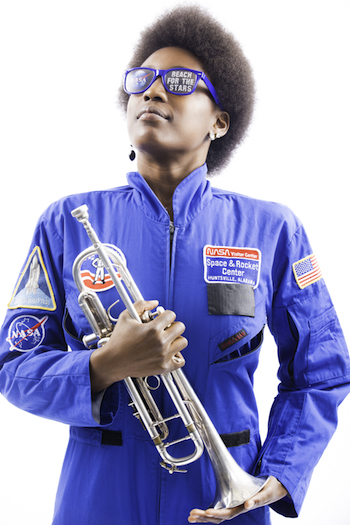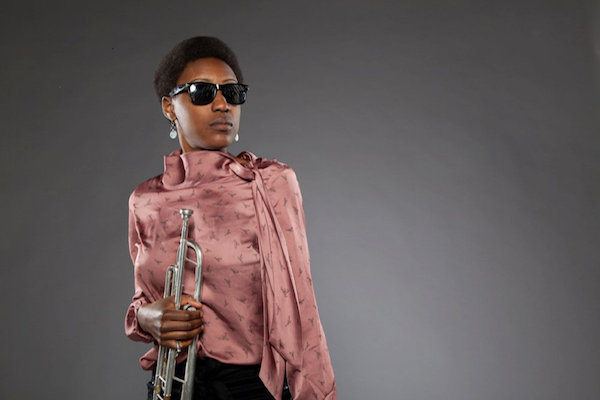Trumpet Wom’ is a triple threat who combines, trumpet, keyboard and singing into original songwriting. She has recorded with GRAMMY winning producer Scott Jacoby, and also recorded at Converse Rubber Tracks in New York City. T’Wom sounds like Nina Simone meets David Bowie and has been playing trumpet for over two decades. She is now self recording her fifth album “Evolution” in alignment with her mission to elevate humanity to a healthier way of being.
How long have you been creating your art?
I have been playing trumpet for 22 years and an avid musician since I picked up the horn at 10 years old.
Where are you from? How does that influence your art?
I’m from Maryland and recently moved to Philadelphia from New York City where I was for six years. I suppose I could attribute the eclectic nature of my music to Maryland, where I grew up with people of varying cultures. While I grew up classically training on trumpet, my walkman/discman was always full of different kinds of music because the other kids I hung out with were listening to all different sorts of things. New York City is where I began to really see the pain around me, in addition to my own pain and as a result I’ve been focusing more and more on how my lyrics and music serve others beyond my natural desire to self express.
What are you currently working on?
I’m currently working on my fifth album “Evolution”. I’m continuing to play around with different sounds and am touching more deeply into my suicidal depression, issues with love and desire to heal myself and others. I’m very focused on being the change I want to see in the world, I see a lot of pain caused by the culture built by capitalism and I just want to show people another way and remind them that they’re not crazy for feeling at odds with what they’re surrounded with.
Additionally, I’m working on writing a “T’Wom” app, as a tool to communicate with fans of my music. It is a slow process as I have no experience with mobile app writing but I additionally want to demonstrate to young black girls that they have more career options than entertainment and fashion. Furthermore, I don’t like using social media and have no desire to use it until I can hire someone to do it for me.
 What is your inspiration? What drives you?
What is your inspiration? What drives you?
I’ve recently come to a place of focusing on “how am I serving” and that is my inspiration. I’ve observed the effect of spreading words of healing and being willing to open up about pain points has on others.
The dark parts of America have really come to light these past few years and it was not this but the reactions of those around me that really made me frustrated. Whether it be something as benign as throwing trash on the street or as evil as kidnapping children from their parents, the complacent, “Matrix has you” like attitudes I see around me in response to these events has really made me focus on the kind of person I’m being and what I am doing for humanity with my actions.
Why is music important to the queer community?
Music heals and communicates with all. The queer community is a community full of people rife with pain. It is critical that people keep expressing themselves and sharing those expressions. Music travels across the globe and can let a queer person silently suffering in a small town know they aren’t alone, giving them strength and a means to get out.
What do you hope to achieve as an artist?
Spiritually, I hope to enhance the lives of those around me for the better. I hope to remind them of their divinity and encourage them to keep getting in touch with this part of themselves. I want to make myself and others happy.
Physically, I want to sell more albums and hope to be selling out venues and tours. There’s nothing quite like the experience of playing live music. The communication and energy that happens is out of this world.
Did music play an integral role in your coming out? If yes, how so?
Yep! I admitted to myself that I was gay sophomore year in college. I particularity remember listening to an acoustic cover of Sam Cooke’s “Change Gonna Come” that Gavin DeGraw did, over and over and over during that time period. The pain and hope in that song was exactly what I needed to push forward and do what needed to be done.
Given challenges facing our country and community, in your opinion, what is most needed for the queer community now? How can the music scene advance that goal?
Togetherness, we need to get off of this label culture and focus on the fact that we have more in common than apart. Even with the queer community I see division happen because of “this label” and “that label”, it demonstrates to me that the true lesson of bigotry—I don’t get you but you’re not hurting me so do you—is not being learned.
As musicians we should continue holding events that bring people of different types together and fostering an environment of healing and growth within them. Quite often the queer community only focuses on dance music for queer events, I think connecting musicians of different genres in singular events would help. And while focusing on highlighting the undeserved artists of the queer community for performances there should be a culture that encourages everybody to come out and hang.
Major Influences.
I’m really influenced by avoiding this question [she laughs]. But if I must I would have to say Chris Gekker and Evanescence were respectively big influences to my trumpet tone and desire to mix a classical sound with more modern sound.
Finish: Art is….
Expression.
How can we all support your work, talent and gift?
The best way is to sign up for my patreon page. You can support for as little as $1 per month and in addition to the monthly perks, I give my new albums to all of my subscribers for free.
Anything else you want us to know?
My humblest thanks for reading my words. Thank you for being you and blessings to your journey.
You can find Trumpet Wom’ and other queer artists at the Womxn Fuck Shit Up Festival (WFSU) on April 20, in Washington, D.C.


